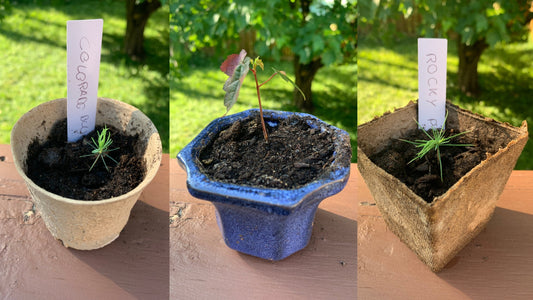Introduction
Water is essential for the health and growth of plants and bonsai. However, not all water is equal in terms of quality and composition. The choice of watering water can have a significant impact on the health and development of your plants.
In this article, we will explore the different irrigation water options available and their respective pros and cons. Whether you use tap water, rainwater, filtered water, distilled water or well water, it is important to understand the implications of each choice to ensure growth healthy and vigorous of your plants and your bonsai.
Tap water: Advantages and Disadvantages for Watering your Plants and Bonsai

Benefits
Tap water is a convenient and affordable watering source for houseplants. It is generally free of bacteria and contaminants harmful to plants. Additionally, it contains essential minerals such as calcium and magnesium, which promote plant growth.
Disadvantages
However, tap water may contain chlorine and other chemicals used for water disinfection, which may be harmful to some sensitive plants. Additionally, hard water, which contains a high amount of minerals, can lead to lime deposits in soil and pots, which can harm plant health in the long term.
Impact of Chemicals and Chlorine on Plants
Chlorine in tap water can be beneficial for killing bacteria, but it can also be harmful to plants. Excess chlorine can damage plant roots and cause yellowing of leaves. Additionally, some chemicals used in water treatment can be toxic to plants, especially if they are exposed to high concentrations over a long period of time.
Tips for Making Tap Water More Suitable for Watering Plants
To make tap water more suitable for watering plants, it is recommended to let the water sit for a few hours before using it. This allows the chlorine to evaporate and thus reduces its impact on the plants. Additionally, using a water softener or filter can help reduce water hardness and remove harmful chemicals, which is beneficial to plant health.
Rainwater: The Ecological and Economic Advantages for Watering Your Plants and Bonsai

Ecological Benefits
Using rainwater for watering plants has many ecological benefits. By using rainwater, you reduce your dependence on municipal water resources, which helps conserve natural resources. Additionally, the collection and use of rainwater helps reduce urban runoff, which can lead to flooding and pollution of waterways.
Economic Benefits
Economically, using rainwater can help you save money on your water bill. By using a free and available water source, you reduce your drinking water costs for watering your plants, which can be particularly beneficial for owners of gardens or large properties.
Precautions for Collecting and Using Rainwater
To collect and use rainwater safely, it is important to take certain precautions. First, make sure your water collection system is clean and free of contaminants. Avoid collecting rainwater from contaminated surfaces such as asbestos or lead roofs. Additionally, be sure to store rainwater in clean, tightly closed containers to prevent the growth of bacteria and algae.
Filtered Water: Advantages and Disadvantages

Benefits of Filtered Water
There are several benefits to using filtered water for watering plants. First, this type of water is free of most of the contaminants found in tap water, such as chlorine, heavy metals, and chemicals, which can benefit plant health. Additionally, filtered water is often softer than tap water, which may be preferable for sensitive plants.
Disadvantages of Filtered Water
However, filtered water can have some disadvantages. First, it may be lacking in some essential minerals that plants can absorb from tap water.
Specific Uses of Filtered Water
Despite its drawbacks, filtered water can be particularly helpful for some sensitive plants. For example, orchids and carnivorous plants are often sensitive to chemicals found in tap water, and may benefit from purer water. Additionally, if you use water-soluble fertilizers to feed your plants, filtered water can help prevent the buildup of mineral salts in the soil.
Conclusion
The choice of water to water your plants and bonsai is crucial for their health and development. In summary, here are the main options:
Tap water :
Tap water is convenient and generally safe for plants, but it may contain chemicals and minerals that can be harmful to some sensitive plants. Do not hesitate to let it rest for several hours in the open air.
Rainwater :
Rainwater is environmentally friendly and economical, but it must be collected and used carefully to avoid contamination.
Filtered Water:
Filtered water is pure and free of contaminants, but it may be devoid of essential minerals for plants.
To choose the best water for your plants, it is recommended to consider the specific needs of each plant, as well as the quality of water available in your area. For the germination of Bonsai Box seeds, we encourage you to take rainwater or tap water that has stood for several hours.
If you enjoyed this article, please share it on social media to help other budding gardeners. You can also subscribe to our newsletter to receive regular gardening tips and tricks. Thank you for following us and see you soon for new green adventures!




